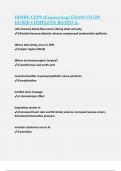Carotid sinus massage - Study guides, Class notes & Summaries
Looking for the best study guides, study notes and summaries about Carotid sinus massage? On this page you'll find 513 study documents about Carotid sinus massage.
Page 4 out of 513 results
Sort by
IBHRE CEPS (Engineering) EXAM STUDY GUIDE COMPLETE RATED A.
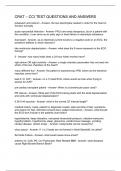
-
CRAT – CCI TEST Q&A
- Exam (elaborations) • 11 pages • 2023
-
Available in package deal
-
- $11.99
- + learn more
potassium and calcium - Answer- the two electrolytes needed in order for the heart to function normally acute myocardial infarction - Answer- PACs are rarely dangerous, but in a patient with this condition, it can serve as an early sign or heart failure or electrolyte imbalance. downward - Answer- as an electrical current travels to a negative pole on an ECG, the waveform deflects in which direction? late ventricular depolarization - Answer- what does the S wave represent on the ECG tra...
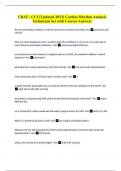
-
CRAT - CCI {Updated 2023} Cardiac Rhythm Analysis Technician Set with Correct Answers
- Exam (elaborations) • 17 pages • 2023
-
Available in package deal
-
- $9.49
- + learn more
CRAT - CCI {Updated 2023} Cardiac Rhythm Analysis Technician Set with Correct Answers the two electrolytes needed in order for the heart to function normally -Ans potassium and calcium PACs are rarely dangerous, but in a patient with this condition, it can serve as an early sign or heart failure or electrolyte imbalance. -Ans acute myocardial infarction as an electrical current travels to a negative pole on an ECG, the waveform deflects in which direction? -Ans downward what does ...
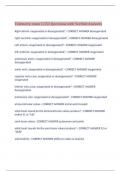
-
Telemetry exam 1|153 Questions with Verified Answers,100% CORRECT
- Exam (elaborations) • 16 pages • 2023
-
Available in package deal
-
- $11.99
- + learn more
Telemetry exam 1|153 Questions with Verified Answers Right atrium: oxygenated or deoxygenated? - CORRECT ANSWER deoxygenated right ventricle: oxygenated or deoxygenated? - CORRECT ANSWER deoxygenated Left atrium: oxygenated or deoxygenated? - CORRECT ANSWER oxygenated left ventricle: oxygenated or deoxygenated? - CORRECT ANSWER oxygenated pulmonary artery: oxygenated or deoxygenated? - CORRECT ANSWER deoxygenated aortic arch: oxygenated or deoxygenated? - CORRECT ANSWER oxygena...

-
Relias Assessments Assistance Material DYSRHYTHMIA
- Exam (elaborations) • 5 pages • 2024
-
- $8.99
- + learn more
Relias Assessments Assistance Material DYSRHYTHMIAS EKG interpretation One of the most useful and commonly used diagnostic tools is electrocardiography (EKG) which measures the heart's electrical activity as waveforms. An EKG uses electrodes attached to the skin to detect electric current moving through the heart. These signals are transmitted to produce a record of cardiac activity. Arrhythmia or dysrhythmia are disturbances in the normal cardiac rhythm of the heart which occurs as a result ...
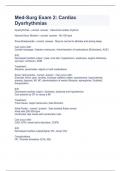
-
Med4 Question and answers 100% correct 2023/2024
- Exam (elaborations) • 4 pages • 2023
-
Available in package deal
-
- $13.49
- + learn more
Med4 Question and answers 100% correct 2023/2024 Dysrhythmias - correct answer Abnormal cardiac rhythms Normal Sinus Rhythm - correct answer 60-100 bpm Sinus Bradycardia - correct answer May be normal in athletes and during sleep Can occur with: Carotid massage, Valsalva maneuver, Administration of medications (B-blockers, ACE) S/S: Decreased cardiac output - pale, cool skin, hypotension, weakness, angina dizziness, syncope, confusion, SOB Treatment: Atropine, pacemak...
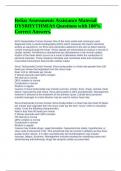
-
Relias Assessments Assistance Material DYSRHYTHMIAS Questions with 100% Correct Answers
- Exam (elaborations) • 5 pages • 2024
-
Available in package deal
-
- $8.49
- + learn more
EKG interpretation Correct Answer One of the most useful and commonly used diagnostic tools is electrocardiography (EKG) which measures the heart's electrical activity as waveforms. An EKG uses electrodes attached to the skin to detect electric current moving through the heart. These signals are transmitted to produce a record of cardiac activity. Arrhythmia or dysrhythmia are disturbances in the normal cardiac rhythm of the heart which occurs as a result of alterations within the conducti...
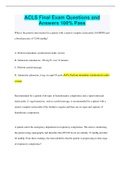
-
ACLS Final Exam Questions and Answers 100% Pass
- Exam (elaborations) • 26 pages • 2023
-
Available in package deal
-
- $9.99
- + learn more
ACLS Final Exam Questions and Answers 100% Pass What is the priority intervention for a patient with a narrow-complex tachycardia (160 BPM) and a blood pressure of 72/48 mmHg? A. Perform immediate synchronized cardio version B. Administer amiodarone, 150 mg IV over 10 minutes C. Perform carotid massage D. Administer adenosine, 6 mg via rapid IV push A. Perform immediate synchronized cardio version Recommended for a aptient with signs of hemodynamic compromise and a superventricualr tachycar...
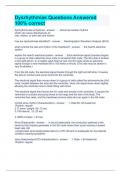
-
Dysrhythmias Questions Answered 100% correct
- Exam (elaborations) • 23 pages • 2023
-
Available in package deal
-
- $25.99
- + learn more
Dysrhythmias Questions Answered 100% correct dysrhythmia aka arrhythmia - abnormal cardiac rhythms which can cause disturbances of: rate, rhythm, or both rate and rhythm how are dysrhythmias identified? Electrographic Waveform Analysis (ECG) what controls the rate and rhythm of the heartbeat? the heart's electrical system explain the heart's electrical system Each electrical signal (impulse) begins in a group of cells called the sinus node or sinoatrial (SA) node. T...

-
Relias Assessments Assistance Material Dysrhythmias Review Questions and Answers
- Exam (elaborations) • 5 pages • 2024
-
Available in package deal
-
- $7.99
- + learn more
EKG interpretation One of the most useful and commonly used diagnostic tools is electrocardiography (EKG) which measures the heart's electrical activity as waveforms. An EKG uses electrodes attached to the skin to detect electric current moving through the heart. These signals are transmitted to produce a record of cardiac activity. Arrhythmia or dysrhythmia are disturbances in the normal cardiac rhythm of the heart which occurs as a result of alterations within the conduction of electrical imp...

Study stress? For sellers on Stuvia, these are actually golden times. KA-CHING! Earn from your study resources too and start uploading now. Discover all about earning on Stuvia

